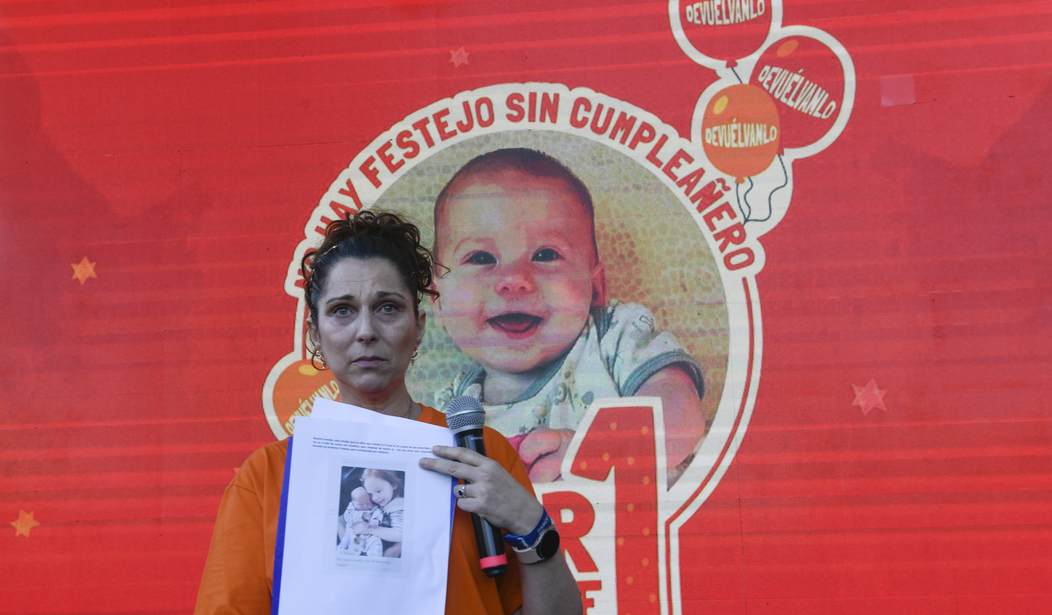Despicable. And yet, it tells us nothing about Hamas that we didn't already know after October 7, or for that matter, the previous two decades in Gaza.
Hamas and Israel have agreed to expedite the exchange of hostages in Gaza for prisoners in Israel today, in an attempt to build some basis for ongoing Phase 2 negotiations in the cease-fire. At the same time, though, Hamas again claimed that Shiri Bibas and her two babies are dead and plan to send their bodies as part of the next exchange.
Understandably, her husband and the rest of her family refuse to take Hamas' word:
The Bibas family says it is “in turmoil” after Hamas’s announcement that the bodies of Shiri, Ariel and Kfir will be returned to Israel on Thursday.
However, the family stresses that it has not yet received an official update from Israeli authorities confirming that their loved ones are no longer alive.
“Until we receive definitive confirmation, our journey is not over,” the family says.
“We ask the media and the public to respect our privacy and refrain from contacting us about this matter,” the family adds.
Hamas claims that their deaths are Israel's fault, as they say the Bibases died in an IDF srike on their position. That, however, ignores the fact that they should never have been kidnapped in the first place. Hamas and Gazans seized unarmed civilian men, women, and children in contravention of all rules of war, and then used them as human shields and negotiating bait. That's on top of the 1200+ Israelis they brutally murdered, most of them also civilians, and conducted a grotesque rampage of rape and torture in the process.
We knew all of that. But this heartbreaking revelation of the murder of innocent babies -- even if it follows a number of such stories from October 7 -- should remind everyone of the nature of terrorism, and of the nature of Hamas and their patrons in Tehran.
The better news is that six living hostages will return this weekend, including two who have been held for a decade:
The families of Omer Wenkert, Omer Shem Tov, Eliya Cohen, Tal Shoham, Avera Mengistu and Hisham al-Sayed announce that they have been informed by Israeli authorities that their loved ones are slated to be released by Hamas on Saturday.
Al-Sayed and Mengistu have been captive in Gaza for over a decade, after entering the Strip of their own accord. All the others were abducted on October 7, 2023.
What led to this acceleration of the schedule? First, there are time pressures coming from Donald Trump to get all of the exchanges complete ASAP, or else. Hamas also wanted some of the Shalit-exchange prisoners who had been recaptured out of prison again. Mainly, they want some heavy equipment to deal with the destruction Hamas has wrought on Gaza by launching the war sixteen months ago:
The reason for this was Hamas's interest in advancing the release of Palestinian prisoners who had been released in the 2011 deal that saw the release of Gilad Schalit and were since imprisoned again, according to the source.
In addition, if this were to happen, Israel would allow caravans and heavy machinery to enter Gaza.
Later on Tuesday, an Israeli official noted that as part of the framework of the deal, Israel was committed to allowing caravans and heavy engineering equipment into Gaza after following inspection.
The source added that subject to Hamas’s compliance with the deal, Israel would begin to allow the entrance of such tools in a gradual and controlled manner.
At this point, one would expect Phase 2 negotiations to commence, now that all of the living hostages in Phase 1 will have been released -- assuming that actually happens. The Hamas Hokey Pokey may hit the stage again, though, because Israel has not yet authorized any Phase 2 negotiations. The security cabinet discussed it yesterda, the Jerusalem Post notes, but didn't even take a vote on an authorization. They will likely wait to see how this latest arrangement proceeds before bothering to discuss Phase 2, especially after Hamas tried to throw sand in the gears last week on Phase 1.
Meanwhile, Arab nations have generated a new plan for post-war Gaza to counter Trump's proposal to seize it and expel the Gazans. Egypt has a consortium willing to invest in Gaza's reconstruction under a government that excludes Hamas, and are also willing to let Trump and Israel help decide how to spend their $20 billion:
The Arab proposal, mostly based on an Egyptian plan, involves forming a national Palestinian committee to govern Gaza without Hamas involvement and international participation in reconstruction without displacing Palestinians abroad.
A $20 billion contribution from Arab and Gulf states towards the fund, cited by two sources as being a likely figure, maybe a good incentive for Trump to accept the plan, Emirati academic Abdulkhaleq Abdullah said.
"Trump is transactional so $20 billion would resonate well with him," Abdullah said.
"This would benefit a lot of US and Israeli companies."
Sounds good in theory, but this is entirely fanciful in practice. How exactly will Egypt guarantee that Hamas has "no involvement" in a post-war government without expelling the Gazans? Will Egypt and the other Arab states occupy Gaza to ensure that Hamas goes into permanent exile -- and if so, where? This sounds like every other Gaza-rebuilding proposal that has come before, all of which ended up going into Hamas tunnels and fortifications so that they could launch their next war against Israel.
Trump is transactional, but he's not an idiot. Neither is Benjamin Netanyahu. And now everyone will have the Bibas children to remind them of the costs of idiocy.









Join the conversation as a VIP Member